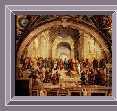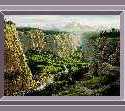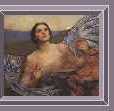Twice Upon a Timers
Gail Carson Levine
A children's literature author of several fairy tales, Ms. Levine has a charming, fast-moving style that sparkles in her retellings. Except for Ella Enchanted, alas, I've not read her other works. Recommendations would be appreciated!
Peter Beagle
The author of The Last Unicorn, Peter Beagle is a pure lyrical delight. He has written several other books - reviews are more than welcome.
William Goldman
With such credits as Butch Cassidy and the Sundance Kid under his belt, William Goldman, the "abridger" of The Princess Bride has a sharp wit and driving style that makes everything he touches funny! He is apparently working on a sequel to The Princess Bride. However, for lovers of S. Morgenstern who "hate waiting," you might attempt to track down his fable, "The Silent Gondoliers."
Robin McKinley
Sadly relegated to the YA section of the bookstore, Robin McKinley is the current pre-eminent folklorist. Her language is beautiful, her stories enchanting, and her morality generally traditional. She bears the legacy of faery and hobbits, and bears it with grace. A word to the wise, however. She has some admittedly pro-feminist tendencies, which sometimes get in the way of an otherwise interesting story. Her more recent books especially espouse this view.
"A Knot in the Grain, and Other Stories," is a collection of five original fairy tales (listed below). The morality wrestles slightly between the secular mores of today and the morals of Christiandom, with a sort of unsatisfactory result. However, the lanugage is beautiful, and the characters for the most part engrossing.
"The Healer," the story of a mute girl who finds love in a telepathic ex-mage, began in a promising manner - using phrases like, "the creaky place that might once have been his heart," and so on - but ends strangely, with them returning to the village and some sense that a deeper meaning was intended but not, at least by me, realised.
"The Stagman," as others have noticed before me, was particularly head-scratch-worthy, dealing with a cruel Regent-uncle, the girl who should be Queen and does not know how, a prince who likes to hunt, and the elusive stagman who, apparently, the Queen leaves her kingdom, husband and four children for...what? Why? HOW? The infidelity is supposed to be poignant, but is merely infidelity.
"Touk's House" can be seen as an interesting 'take' on the Rapunzel legend, but ends with the message that kings are rotten and trolls (TROLLS!?!) are lovable. Again, the ending is confusing, since the images cast upon us feel as though they ought to be wrought with great significance. Feministic, anti-hierarchical, anti-patriarchical, diversity @(*#% all evidenced in this one.
"Buttercups" is perhaps the best story, structurally, following the wedding of a farmer to a girl twenty years his junior, and their marital struggles. No real moral dilemmas here, except that, like the previous three ones, this isn't Christendom (although it certainly feels like it), but in some pre-revelation world.
The last story, from which the title of the book takes its name, is not quite as bad as the previous reviews had led me to believe. The story is a snippet of a modern girl's life, dealing not so much with the knot as with a magical wishing box she finds. However, it's only a snippet of her life and leaves several threads dangling. Rather depressing teenager angst.
All in all, fans of McKinley will probably want to buy this book if only for her voice and not as much for her pat plots. "A Knot in the Grain" is not a poor book, it merely isn't her best.
Previous to writing this review, I read with great interest the raging (and ranging) debate over the merit of the extraordinarily talented Robin McKinley's "Deerskin." And, as others have mentioned before me, the difficulty seems to lie primarily in how the reviewer approaches the novel: as a piece of literature or as a fictionalised chronical of a rape victim's return to the world. As I am, thank God, emininently unable to comment on the verisimilitude of the latter, I shall confine myself to the former, namely "Deerskin's" literary merit - and pray that those who read my review judge it likewise as a poor attempt to sum up *writing* and not *experience.*
Drawing primarily from Perrault's "Donkeyskin," and thereby also from Grimms' "Thousandfurs," McKinley delves into the story of the young, neglected princess, Lissla Lissar, as she grows to womanhood. Her mother, the most beautiful woman in the seven kingdoms, has passed away - but not before extracting from Lissar's father, the king, a promise that he would not marry anyone less beautiful than herself. And who could ever compare to such beauty than her daughter, Lissar. The King, in his madness, declares that he shall wed his own flesh, and when she (passively) refuses, he rapes her.
This ultimate act of degradation sends Lissar out with her trusty dog Ash (a present from none other than Prince Ossin) to the wilderness to escape her father. She suffers memory loss and miscarriage (obliquely mentioned), and then is healed of her physical wounds by "The Lady," presumably a goddess *long-suffering sigh*. This prompts her to journey to Prince Ossin's lands where a quasi-Cinderella story takes place, with the common interest between the two royalty being fleethounds. Then comes a ball, a proposal, and a fleeing (this time taking the glass slipper, aka six puppies, WITH her), some sort of wandering wherein Lissar acts rather goddess-y herself, and a final, unsatisfactory and strangely described confrontation between the princess and her father.
In its generalities, "Deerskin" is a fair retelling of the original fairy tales. The language is good, if sometimes confusing; the worldbuilding adequate; the characters oddly often faceless. McKinley seems to be attempting to translate some of the original plot elements (such as the three dresses the Princess demands from her father in the beginning) into more plausible realities (i.e., the dresses appear as gifts from Ossin's mother), especially in her introduction of the dogs as the binding element between a Prince and a girl who has lost her memory.
However, as admirable as this effort is, it falls flat. The fleethounds become *too* central, detracting from character development. Rather than demanding dresses like the sun, moon and stars, and then a cloak of deer/donkey/thousandfurs-skin, Lissar skulks around her room as though waiting to be raped, and McKinley introduces the confusing and slightly off-putting deus-ex-machina of "The Lady" aka "Moonwoman," which she attempts to bind up in Lissar's very existance.
The final confrontation with Lissar's father is a stroke of genius, and sadly lacking in either of the original fairy tales (which always felt like two stories smooshed into one). However, the *execution* of this plot twist comes off badly as McKinley attempts to bring together all the *thought* elements (Moonwoman, effects of rape, mother-oppression, burgeoning love) into one dream-like sequence.
The reading moves along very well when McKinley sticks to the basics of the originals - the time in Lissar's father's court is particularly compelling, and the time spent with Ossin not bad - but the middle and penultimate segments when Lissar wanders off to lick her wounds are tedious to read, although they may be an honest record of a broken mind piecing itself together.
Ultimately, "Deerskin" is am ambitious and partially successful retelling of a particularly "touchy" fairy tales, and McKinley does an admirable but not quite excellent job with it. Fans of McKinley's other works might be disappointed by the intermediary parts of this book; those considering reading McKinley for the first time would do better to invest in her other works first.
Continuing her tradition of respinning familiar fairy tales, McKinley's latest novel, Spindle's End is an original and delightful take on the Sleeping Beauty myth. However, in typical McKinley fashion, the focus of her concern is less the royal preparations and worries surrounding Briar-Rose (here, Rosie's) singular curse, but around Katriona, the fairy who becomes Rosie's foster mother, and Rosie's provincial tom-boyish life. This behind-the-scenes look at the popular tale is at once sweet and exciting, as Rosie gains the ability to talk to animals (less campy than it originally sounds), both she and Katriona fall in love, and we are introduced to such memorable characters as Aunt, Narl, and Peony.
The only difficulty with the novel rests in its final forty pages, which - in a dreamlike style that seems to be inevitable in these retold fairy tales - attempts to explain the defeat of the evil fairy Pernicia in actions which are mostly incomprehensible. Parents might also find some difficulty in the second "wake-up kiss" (the first being rather more interesting), which is between Rosie and Peony. The moment is brief, and non-homoerotic, however may cause some consternation on the part of young American readers, especially. The conclusion is apparent from about midway through the book, if one is in the least familiar with McKinley's idea of what "happily ever after" means. Likewise, since this is a McKinley book, gods and fates are the local deities, and there are a few derrogatory comments scattered throughout the book pertaining to the priesthood.
But niggling quibbles aside, Spindle's End is a truly charming tale, told in those sweet, swift strokes of which McKinley is a master. Those who preferred her recent "darker" books may find this a slight disappointment. But those who enjoyed Beauty, and McKinley's earlier books will most certainly enjoy Spindle's End.
Patricia McKillip
If you like McKinley's books, you will also enjoy Patricia McKillip's original fairy-tale-like books. Her prose is absolutely exquisite, but one ought to keep one's thinking cap on while reading: she keeps a pre-revelation world. *sigh*
Mercedes Lackey
As mentioned before, Mercedes Lackey has been recently turning her hand towards the retelling of fairy tales - a woeful decision if ever there were one! Combining her maudlin prose, her weak characters, and her propensity towards casual if not graphic sex, Lackey's slaughtering of fairy tales are best left unread. To date, she has massacred Swan Lake with her book The Black Swan which makes a womanizer out of the hero and a hero out of the villainess, as well as the Russian Firebird myth, Firebird, which again includes casual sex. (*Editors Note* The literary quality of the latter was also so horrid that I literally could not finish the book.)
Final analysis: why bother?
Miscellaneous Retellers
Another authoress commonly associated with the retellings of Fairy Tales is Donna Jo Napoli. Again, she's on my reading list, and a review from some marvellous person out there would be more than appreciated, but from all the reviews, synopsises, etc., that I've read, I would imagine that it were best to step lightly around her. Her books tend to take fairy tales and bring into them all those adult themes that the acolytes of Freud revel in, and make them full blown or set them on their ear. She also tends to make the villain of the story the hero, and visa versa - a dangerous thing to do. Until, then, I can get some concrete reviews, I'd categorise her thus:
The best story in the collection is the story about Rapunzel, wherein the author (sorry, don't have the book on hand!) deals precisely with the question of the ramifications of retelling fairy tales. His conclusion is unsatisfactory - since he seems to long to marry the secular answer with the one written on his heart (basically he says something along the lines of forget the authorities/authors, and just live your life/believe in yourself/choose your destiny, etc. - *sigh*), but his execution is interesting. "Jack and the Castle," the second of the Jack and the Beanstalk retellings (the editor really could have used a course on fairy tale delegation) is also very good, with a satisfactory ending, and good morals - certainly loads better than either of the other two retellings of that tale which both took place in a courtroom. "One Fairy Tale: Hard Boiled" is the search for Rumplestilskin's name from the point of view of a private eye - a fun read, even if he drags in Hansel and Gretel, like several others do. However, these are only three stories - there are many, including retellings of Prince Charming's many loves, the Snow White story, the Big Bad Wolf's story, the Steadfast Tin Soldier's story which include animalistic and sometimes bestial sexuality and violence. Overall, there are no stories so utterly compelling that one must buy the anthology just to read it, and the mediocre and horrid tales more than overwhelm those few which are half-intriguing.
But, as every good fairy tale ought to have an explicit moral, mine will be this: the retelling of Fairy Tales is a tricky thing, and too often done to expiate the villain or add in that which is offensive, mainly, because the modern authors - at least those who are actively writing and submitting books to publishers - do not know how to improve on such timeless tales, and so fall back onto Sophomoric jokes and "heroics." However, as McKinley and several others have proven, it is possible to write excellent Fairy Tales - whether original or retellings - with beautiful language and orthodox morals (indeed, these very two elements are the hallmark of the whole sub-genre!). So, a word of encouragement to all you bedtime story-spinners out there...WRITE IT DOWN and SEND IT IN! It's no good bellyaching over the deplorable lack of Christian Fantasy if we don't publish some ourselves. Ah well, I'm done with my diatribe.
While browsing through Amazon, I came upon another anthology of retold Fairy Tales, called Kissing the Witch : Old Tales in New Skins by a lady named Emma Donoghue. Without having read the book, merely the reviews, I'd strongly caution to stay away from not only this work, but her others as well. Apparently she not only gives Freud a run for his money in her versions of classic legends, but she also introduces feminist and lesbian themes.
(c) 2000

 Ella Enchanted
Ella Enchanted
Literary Quality:
A charming retelling of the Cinderella story, Ella Enchanted explains several of the more touchy points of that legend in a fun, intelligent, suspenseful and romantic way that makes the book a real page-turner. Why, for example, did Cinderella never just up and leave her rotten situation? Ms. Levine posits that unbeknownst to the brother Grimm, little baby Ella was under a curse to always obey - everything from "Eat your peas" to "Jump off a bridge." The romantic element, promising love based on looks, Ms. Levine rectifies by acquainting Prince Charmont and Ella early on. Also incorporating intelligent language, good worldbuilding, a bestiary of mythical animals, and two fairy godmothers, Ella Enchanted is a sweet romp through Fairy Tales' most common story. A delightful read for every age!
Christian Morality: Harmless
Age Appropriateness: Children/Adult The Last Unicorn
The Last Unicorn
Literary Quality:
A delight to the soul this seemingly simple book works on several levels - beautiful morality, lyricism, allegory, storyline - the work itself is as graceful as the unicorn herself. The quest is this: the last unicorn discovers that all the other unicorns are missing and sets out to discover their whereabouts. Along the way she is joined by a struggling magician and a sharp-tongued woman. When it becomes apparent that the unicorns have all been stolen by the evil King Haggard, the magician turns the unicorn into a girl to save her - but even he cannot forsee the results his action would take. A beautiful novel that probes the meaning of beauty, truth and duty, appropriate for every age.
Christian Morality: Excellent/Good
Age Appropriateness: Children/Adult The Princess Bride
The Princess Bride
Literary Quality:
Officially titled, The Princess Bride : S. Morgenstern's Classic Tale of True Love and High Adventure : The 'Good Parts' Version, Abridged [ABRIDGED], this is a classic fairy tale for all ages. Children will love the derring-do of Westley vs. Prince Humperdink, and literature afficiandos will be rolling on the floor due to Goldman's singular style of "abridging." About the only possible objection to the work comes in the "Abridger's Introduction" which may be easily skipped. In it, Goldman shows some contempt for his wife and son (apparently, supposed to be taken facetiously), and is briefly tempted by a bronze swimming bimbo. Those who love the book will love the movie and vis versa (one of the rare instances of both film and book being equally good!). A treasure for all!
Christian Morality: Good
Age Appropriateness: Children/Adult
Ms. MicKinley's books are available here, including her award-winning YA novels, The Blue Sword and The Hero and the Crown, which, although I've not read, my sister generally recommends (with reservations - some feminist thinking in both, and extra-marital affair in the latter) for teenagers and up. Beauty
BeautyLiterary Quality:
Her first retelling of the Beauty and the Beast legend, this book is deservedly well-beloved. Staying close to the original story, McKinley's embroidery only adds to the wonder of the original.
Christian Morality: Good
Age Appropriateness: Pre-TeenLiterary Quality:
Comprised of four fairy tales, two original ("The Stolen Princess," "The Hunting of the Hind") and two retellings ("The Twelve Dancing Princesses," "The Frog Prince"), The Door in the Hedge is a beautiful example of McKinley's master touch. Recommended for all ages.
Christian Morality: Excellent/Good
Age Appropriateness: Child/Pre-TeenLiterary Quality:
Modified from E. Snyder's Amazon review.
Christian Morality: Harmless/Dangerous
Age Appropriateness: Pre-Teen/TeenagerLiterary Quality:
Modified from E. Snyder's Amazon review.
Christian Morality: Dangerous
Age Appropriateness: AdultLiterary Quality:

Christian Morality: Harmless/Dangerous
Age Appropriateness: Pre-Teen/Teenager Winter Rose
Winter RoseLiterary Quality:
A coming-of-age story about the fee Rois who falls in love with a fee trying to become human, Corbet Lynn. Her love for him prompts her to discover the truth behind the generational curse lying over his head, and so doing learns about herself, her family, and life. The language is haunting, the whole utterly engrossing. A mysterious woman plays a part that could either be merely mythical or dangerously pagan - however, her part is shown primarily as antagonist (think the Snow Queen from Anderson), and so remains fairly harmless. Difficulties arise when McKillip introduces the theme of infidelity as something one cannot "help" (ha), and therefore "not that bad" or at least "not worth thinking about," which image of love is inconclusive at the end of the novel when the hero and heroine make polite conversation rather than passionate proposals, like her rescue of him should have effected. Despite these drawbacks, it is a charming and enthralling tale, worth reading to those a little older in mind and faith.
Christian Morality: Harmless/Dangerous
Age Appropriateness: TeenagerLiterary Quality:
Combining several "thought" elements together in a single, beautiful tapestery, McKillip takes on the power of words and naming, the meaning of sorrow, man's capability for evil, and the shouldering of responsibility. Following three characters (on a nearly-systematic rotating chapter basis), Prince Talis Pelucir, Mage Atrix Wolfe, and the fey Saro, the reader is taken on a quest to discover the true nature of The Hunter (created by Atrix Wolfe), find the daughter of the Queen of the Forest, and save the kingdom from a second destruction. Along the way, Talis struggles with his romantic feelings for the Queen of the Forest, Atrix struggles against the Hunter who is his "darker" self, and Saro who is mute struggles against language to warn the men of danger. The scenes of Saro in the kitchen are at once heartwarming, enchanting, and impressive (or so says this complete culinary ignoramus!). Not enough time is given to Talis' own magecraft, and Atrix's story tends to become repetitious towards the middle. There are pagan elements, similar to those used in Winter Rose (the Queen of the Forest = goddess, her horned consort = god), but these are much more subtle and present little to no theological difficulties. Some ying-yangism is present in Atrix's struggle against the Hunter - the two are the manifest light and dark sides of a single self (think Star Wars). However, despite some minor quirks, The Book of Atrix Wolfe is a far more enjoyable, followable, and completed story than Winter Rose. Its theme of the power of words is compelling, its comment on the wrongness of inverting the meaning of words right up any Christian's alley. As always, McKillip's prose alone is worth the price of the book! A good starting place for those interested in her work.
Christian Morality: Harmless
Age Appropriateness: TeenagerLiterary Quality:

Christian Morality: Dangerous/OffensiveAge Appropriateness: Adult/InappropriateLiterary Quality:

Christian Morality: Dangerous
Age Appropriateness: Adult
Literary Quality:
This collection of retold Fairy Tales, edited by Denise Little, is your basic example of the state of the genre today. In their retellings of mainly Grimms' and Anderson's stories (including three that deal with Jack and the Beanstalk, two with Rumplestilskin, and most with cutesy cross-references all over the place - I'd no idea so many people had difficulties with the Hansel and Gretel tale!), about a third are really well done, a third are written well but with dangerous or offensive content, and a few are just paltry.
Christian Morality: Harmless/Dangerous/Offensive
Age Appropriateness: Adult/Inappropriate
Literary Quality: N/A
Christian Morality: Offensive
Age Appropriateness: Inappropriate





Updated 6 October, 2000
All Rights Held by the Author.
No part of these pages may be used or copied without express permission of the author.
